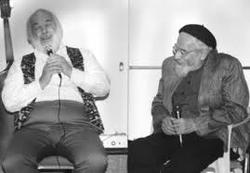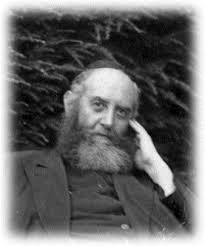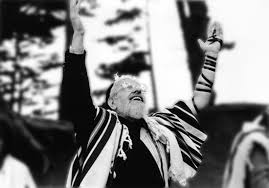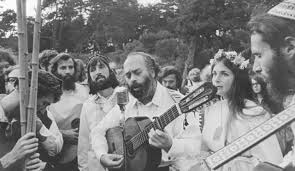 Renée and I are honored to be part of the Reb Zalman Legacy Shabbaton April 24-26 in Ashland, Oregon. Seems like a good moment to share a story of two Rebbes and close friends whose lives and teachings continue to inspire so many of us. Chag Sameach, R' Mark Shlomo Carlebach and Zalman Schacter, young rabbis in their mid 20s, are standing in a narrow, dimly lit hallway on the second floor of 770 Eastern Parkway, the three-story headquarters of the Lubavitcher Rebbe, waiting nervously, with their eyes fixed on the door in front of them. Even the fact that they are here together is a miracle in itself, a blessing from God. They had first met in Baden bei Wien, before the Nazis had taken over, when Zalman, then 11 years old, showed up on the Carlebach's doorstep, holding a dead chicken. Zalman's father had sent him to ask Rabbi Carlebach is it was kosher. Rabbi Carlebach examined the chicken and declared it kosher. Then he introduced Zalman to his sons, Eliyah Hayyim and Shlomo, who were 10 years old. The three boys ran off to play ping pong. Zalman's own family was not able to leave Austria by train as the Carlebach's had; but with the help of smugglers, the Schacters escaped on foot across the German border into Antwerp, Belgium. From there, they fled to France and would up in an internment camp for Jewish refugees, before eventually being released to travel to Marseilles. There, Zalman met a charismatic rabbi with whom he was very taken. After his family finally arrived in New York in 1941, Zalman learned that this rabbi was Menachem Mendel Schneerson, the son-in-law of the sixth Lubavitcher Rebbe Rabbi Yosef Yitzchak Schneerson, head of the great Hasidic dynasty. The Rebbe had also escaped from Europe and arrived in New York just a year before Zalman, setting up his home and headquarters in Brooklyn. Zalman soon became a Hasid of the Rebbe, and when Zalman and Shlomo found each other again in New York, Zalman learned that Shlomo and his brother Eliya Hayyim had already been to see the Rebbe. At first Shlomo was hesitant about becoming a Hasid. He was already studying at America's foremost Torah academy, Lakewood yeshiva, the intellectual center of the orthodox Jewish world. where he was recognized as an illui, a genius. It was rumored that Rabbi Aharon Kotler, the renowned head of the yeshiva, was grooming Shlomo to succeed him. But over time Shlomo came to realize the life of the mind, even in a community of brilliant minds, would not satisfy him. He needed something more. What the Rebbe offered him was a path with heart. So Shlomo left Lakewood to learn with the Rebbe. The door opens. An older Hasid, Berel Haskind, sticks his head out. In a soft voice, almost a whisper, he says in Yiddish: Die Rebbe ruft eich, "The Rebbe's calling you." They follow him into the Rebbe's mother's room where he held a small farbrengen (gathering).  Wearing a black silk robe, the Rebbe sits propped up on an upholstered chair at a small table. Standing around the room are several old men with long, white beards, whom the young men recognize as the Rebbe's closest Hasidim. The Rebbe nods, and one of the old men fills three shot glasses on the small table with vodka, passing them to the Rebbe, Shlomo, and Zalman. They make a blessing and everyone says, "L'Hayyim!" making a toast to long life for the Rebbe. The Rebbe looks at Shlomo and Zalman. He takes one more sip of his vodka, and hands the glass to one of the Hasidim, who also takes the glasses from the two young men, and puts the glasses in the dresser. The Rebbe speaks softly in Yiddish. His voice is weak, but his eyes are filled with fire. "The time has come," the Rebbe says, looking first into Shlomo's eyes, then Zalman's. "You have been chosen. God has given you both great gifts. With great gifts come great responsibilities." The Rebbe coughs. Berel Haskind hands him a handkerchief, then a glass of water. After a moment, the Rebbe continues: "I am sending you both as my personal emissaries. I want you to go to college campuses. I want you to find the Jewish students there." The Rebbe takes a sip of water. "What do you want us to say to them?" Shlomo asks. The Rebbe looks at him. "I am sending you to reach out to them, "he says. "God will show you what to say. He will put the words in your mouth." The following week is Hanukkah. Shlomo and Zalman get hold of a car, an old Plymouth, and drive up to Boston to visit their first college campus, Brandeis University, When they get there in the evening, they discover a Hanukkah party in the student union, where students are dancing to 1940s swing music. The young rabbis walk in carrying the stuff they've brought with them: a tape recorder, with Hasidic music, a stack of handouts with Hasidic teachings, and a bag of tefillin. The room goes silent, and all eyes are on them. Shlomo walks over to a table on one side of the room; Zalman walks over to a table on the other side. As curious students wander over, Shlomo begins telling stories. One student says, "This sounds like Hindu mysticism." Shlomo keeps going from story to story as more students gather. Zalman talks aboutKabbalah and the Upanishads at his table, where students are also gathering. Pretty soon, everyone in the room is gathered around these two tables. The stories and discussions continue late into the night. ************ And the stories, and the discussions, and the songs, and the niggunim, and the Torah continue late into our nights, and days. Excerpted from Aryae Coopersmith's wonderful book, Holy Beggars. ************ Please consider offering a tax deductible donation to support this project and the work of DC's Jewish Renewal community Minyan Oneg Shabbat. Thank you. ************ Reb Levi Yitzchak of Berditchev ztz"l used to wish everyone "a kosheren Purim" and a "freiliche Pesach". Of course everyone else usually says the opposite: "a freiliche Purim- a happy Purim" and "a kosheren Pessach-a kosher Pessach". Someone asked Reb Levi Yitzchak to explain why was he reversing the blessings? And so he explained: "everyone knows that on Purim you have to be happy and to be sure we are even obligated to get drunk, but in the midst of the Purim festivities someone might forget that Purim also has to be kosher" - hence he would wish all "a kosheren Purim; "Pesach on the other hand, everyone is so busy cleaning and getting rid of their 'chametz', which is a very strict mitzvah in the Torah, and in the process some may forget the mitzvah of "v'samachtah b'chagechga" - you shall rejoice in your holiday - hence he would wish everyone a "freilichen Pessach". So ...let's bless one another with "A KOSHEREN UN FREILICHEN PESACH!" ************
2 Comments
Tamar
4/8/2015 05:26:28 pm
Thank You for sharing this fascinating backstory.
Reply
Reb Mark
4/24/2015 03:40:14 am
Thanks for reading it!
Reply
Your comment will be posted after it is approved.
Leave a Reply. |
Mark Novak is a "free-range" rabbi who lives in Washington DC and works, well, just about everywhere. In 2012 he founded Minyan Oneg Shabbat, home to MOSH (Minyan Oneg Shabbat), MindfulMOSH (Jewish mindfulness gathering), and Archives
June 2017
Categories
All
|


 RSS Feed
RSS Feed
